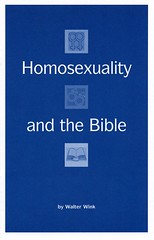African Christians and Homosexuality
 |
| "Homosexuality & the Bible" booklet (Photo credit: Fellowship of Reconciliation) |
Two African leaders have articulated this strong feeling against homosexuality. Daniel Arap Moi, the former president of Kenya, is reported to have said: “Kenya has no room or time for homosexuals and lesbians. Homosexuality is against African norms and traditions and even in religion it is considered a great sin. Homosexuality is a scourge which runs counter to Christian teachings and African tradition.” Similarly, the president of Zimbabwe, Robert Mugabe has said, “I find it extremely outrageous and repugnant to my human conscience that such immoral and repulsive organizations, like those of homosexuals who offend both against the law of nature and the morals of religious beliefs espoused by our society, should have any advocates in our midst or even elsewhere in the world.”
Mugabe blames Westerners for introducing homosexuality to Africa. However, it is historically false to assert that there were no same-sex relationships in traditional Africa. While there are no known records of same-sex marriages, homosexual relationships were known. In Northern Nigeria, some cultures had homosexual prostitutes called yan daudu. In the 1970s, these male prostitutes would come out annually to dance in the open square. Though female prostitutes were despised, male prostitutes were still more despised and were considered very degenerate.
Current Attitudes to Homosexuality in Africa
Over the past decade, homosexuality has moved from being a taboo topic to centre stage. One precipitating factor was the election in 2003 of an openly gay bishop, Gene Robinson, by the Episcopal Church in the United States of America. This action created a crisis, with many African Anglican church leaders threatening to break away from the Anglican Communion. At a meeting of Anglican leaders in Zanzibar in 2007, the Rev. Peter Akinola and six other conservative archbishops refused to take communion with Katherine Jefferts Schori, the leader of the American Episcopalians.
Gay and lesbian rights groups are now speaking up and seeking legislation to protect homosexuals. In response, the governments of countries like Nigeria, Kenya, Zimbabwe and Rwanda have voiced their repugnance and anger at the idea that they should accept same-sex attractions and same-sex weddings. South Africa is the only African country in which such weddings are legal.
What are the main factors, apart from the election of Bishop Robinson, that account for this sudden change?
• Demands for freedom of speech and human rights. Today everybody has the right to express an opinion, even if their opinion is that of a minority or is ethically wrong. Taking a cue from their Western counterparts, homosexual advocates have come out of their closets and argue their case in terms of individual freedom and human rights, with the unflinching support of human rights organizations.
• Desire for morality to be based on empirical and scientific data. Psychological, social and empirical data have replaced biblical authority and religious conviction as authoritative guides to ethics and morality. In particular, homosexual advocates parade any scientific evidence that suggests that being homosexual is not a matter of choice but of constitution, regardless of whether the evidence is conclusive. Their argument is that if something is innate, it must be acceptable.
• Erosion and abandonment of traditional values and beliefs. Africa is experiencing a rapid erosion of the values and traditions that held the community together. A new generation of Africans are rejecting traditional beliefs and practices as backward and unacceptable in this scientific and post-Christian age. The community, which used to be the arbiter of morality, is no longer seen as authoritative. Elders have lost their place in the education and training of the younger generation. Fathers cannot tell their sons what is right and wrong, and mothers cannot do the same for their daughters. The god of individualism has been promoted by the all-powerful media and is the new source of authority and allegiance.
• Rejection of biblical revelation and ecclesiastical faith and practice. People’s world view is no longer shaped by the Scriptures and the church. Instead it is shaped by secular, humanistic thinking. Such thinking singles out love as the most important factor in marriage, and regards the question of whether those in love are heterosexual or homosexual as irrelevant. It is the presence of love that is decisive. Consequently the very definition of marriage is being challenged. In South Africa, the Marriage Act originally defined marriage as “the union of one man with one woman”, but after a legal challenge it was changed to “the voluntary union of two persons”. Such a change marks a clear rejection of the biblical and Christian definition of marriage.
• Advances in reproductive technology. In Africa, people got married in order to have children. However, these days “technology has broken the link between sexual intercourse and procreation; and this, in turn, has made the connection between intercourse and marriage unnecessary”. Homosexuals can now use medical options to have children without committing themselves to heterosexual relationships.
Kunhiyop, S. W. (2008). African Christian Ethics (pp. 304–306). Grand Rapids, MI: Hippo Books.


